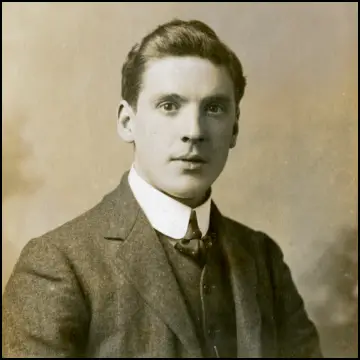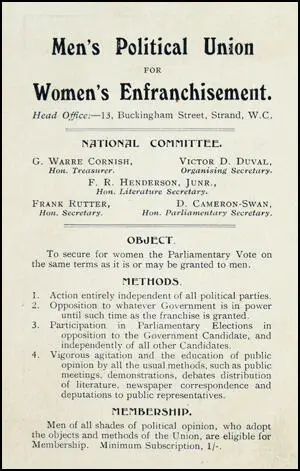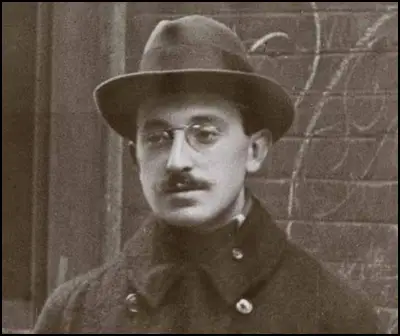Men's Political Union for Women's Enfranchisement
The Women Social & Political Union (WSPU) did not allow men to join the organisation. On 13th January 1910, Victor Duval and Hugh Franklin formed the Men's Political Union for Women's Enfranchisement. Duval explained that "The society was formed as a result of a growing conviction among men, as well as women, that the delay in removal of the sex disqualification from the Parliamentary franchise was due to the determined indifference of the Government rather than to any considerable opposition in the country." (1)
In a leaflet published in 1910 the MPU pointed out that it would oppose all governments in power until such time as the franchise is granted. The MPU outlined the methods it would use: "Vigorous agitation and the education of public opinion by all the usual methods, such as public meetings, demonstrations, debates, distribution of literature, newspaper correspondence and deputations to public representatives." (2)

Other members of the Men's Political Union for Women's Enfranchisement included Henry Nevinson, Hugh Franklin, Gerald Gould, Frederick Pethick-Lawrence, Israel Zangwill, G.D.H. Cole and Henry D. Harben. These men became known as "suffragettes in trousers". (3)
Hugh Franklin attended the demonstration on Black Friday and was arrested, but not charged. He was outraged by the police tactics, and decided to target Winston Churchill, whom as home secretary he believed to be responsible for the large amount of violence that had taken place that day. (4) Although in public Churchill supported women's suffrage he was opposed to any general extension of the franchise. He told George Riddell: "The truth is we already have enough ignorant voters and don't want any more." (5)

Hugh Franklin attended a public meeting held by Churchill in Bradford on 22nd November, 1910. During the meeting Franklin constantly interrupted Churchill's speech and was ejected from the building. After the meeting Franklin and Ainsworth followed Churchill to the station and boarded the evening train to London. As the Home Secretary passed along the train on the way to the dining-car Franklin pulled a dog whip from his pocket and attempted to attack him. (6)
Two police detectives intervened before Franklin was able to deliver a blow. According to Detective Sergeant Sandercock, Franklin jumped up and drew a dog whip from his pocket, and shouted: "Winston Churchill, take that, you dirty cur!" The detectives forced him back on to the seat and Inspector Parker took the whip from him. Franklin admitted that he called Mr Churchill a cur, but said he did not use the word "dirty". (7)

Hugh Franklin was sentenced to six weeks' imprisonment in Pentonville Prison, where he went on hunger strike. He also, he was dismissed from employment as private secretary to Sir Matthew Nathan, then secretary to the Post Office and a prominent member of the Anglo-Jewish "cousinhood". (8)
On 8th March 1911, Hugh Franklin was arrested and charged with throwing stones outside the home of Winston Churchill in Eccleston Square. In court Franklin "said his motive in going to the Home Secretary's house was because of the treatment a friend of his was undergoing in Pentonville Prison. His friend was in prison because he refused to be bound over and was not being accorded special treatment. The friend had refused food, and was possibly being forcibly fed. He thought a protest should be made." He was sentenced to a month's imprisonment." (9)
On 17th October, 1910, Victor Duval was charged with using threatening and insuting language when David Lloyd George arrived at the City Temple to address a meeting of the Liberal Christian League. The police alleged that Duval had rushed from the crowd, and grabbed the chancellor's coat lapels as he got out of his motor car, shouting, "Traitor! Lloyd George, you're a scoundrel, and a traitor to the woman's cause." Duval was found guilty and was sentenced to seven days in Pentonville Prison. (10)
In November 1911 Duval was arrested during a demonstration outside the House of Commons. "The defendant, Victor Duval had been remanded last week that he might call evidence for the defence on a charge of obstruction. One witness said the policeman clutched Duval's throat, and forced his head back for two or three minutes. The police behaved riotously towards the woman in his opinion. Prisoner also made allegations against the police. After fining Duval 10s on a charge of obstruction the Magistrate said there had been a good many cases arising out of the disturbances, and he had dealt leniently with them. If anything of the kind occurred again the offenders must not expect to get off so easily. In cases of wilful damage, especially of personal violence, he should deal very differently with offenders than he had on this occasion." (11)
Hugh Franklin became engaged to Elsie Duval, a member of the Young Hot Bloods. They both carried on with their arson campaign. In February 1913, Hugh Franklin set fire to an empty Great Central Railway carriage at Harrow Station. He went into hiding above Henderson's bookshop at 66 Charing Cross Road. He was arrested later that month. (12)
On 8th March 1913 Franklin was found guilty and was sentenced to nine months' imprisonment. The Sunderland Daily Echo reported "When sentence was pronounced he informed an uninterested bench that he would not take any food. He will get it nevertheless, and no section outside the prison will make any fuss because a man is forcibly fed without nice consideration for his feelings. A man who sets fire to a railway carriage, imperilling the lives of innocent people, should be condemned to a long term of hard labour if two doctors cannot certify him to be a fit inmate for a lunatic asylum." (13)
Hugh Franklin immediately went on hunger-strike and on 22nd April 1913, Keir Hardie, the leader of the Independent Labour Party, took up his case with Reginald McKenna, the new Home Secretary. Hardie asked whether he had been informed that Franklin's "nervous system is so seriously impaired that his reason is endangered". McKenna replied: "Mr Franklin's mental condition cannot, in view of the crimes he has committed, be regarded as normal, but it has not in any way deteriorated during his imprisonment. As he had lost weight to the extent of 121bs., he was examined a fortnight ago by a specialist, since then there has been no further loss of weight, and there appears to be no necessity at present for a further consultation. There is nothing in his condition to render immediate release necessary." (14)
The case was raised again a few days later in the House of Commons. The Conservative Party MP George Touche asked the Home Secretary if he "forcibly fed upwards of one hundred times". McKenna confirmed this but added he "could not say whether that constituted a record". The Men's Political Union for Women's Enfranchisement (MPU) held a protest meeting against the forcible feeding of Franklin, in the Kinsway Hall. Speakers included Emmeline Pethick-Lawrence, Henry Nevinson, Israel Zangwill and Henry Harben. (15)
Primary Sources
(1) Men's Political Union for Women's Enfranchisement leaflet (January, 1910)
Object: To secure for women the Parliamentary Vote on the same terms as it is or may be granted to men.
Methods: (1) Action entirely independent of all political parties. (2) Opposition to whatever Government is in power until such time as the franchise is granted. (3) Participation in Parliamentary Elections in opposition to the Government candidates, and independently of all other candidates. (4) Vigorous agitation and the education of public opinion by all the usual methods, such as public meetings, demonstrations, debates, distribution of literature, newspaper correspondence and deputations to public representatives.
(2) The Reynolds's News (4th December 1910)
The male suffragist, Hugh Franklin, who is alleged to have attacked Mr Winston Churchill with a whip in a train on his way to London from Bradford, was charged with assault at Bow Street on Monday.
Franklin, who is twenty-ne, is of independent means, and lives at Pembridge Gardens, Notting Hill. He is stated to be a nephew of Mr Herbert Samuel, the Postmaster General.
Mr Bodkin said Franklin had provided himself with a dog whip, and as the Home Secretary passed along the train on the way to the dining car Franklin pulled the whip from his pocket, addressed some violent language to the Home Secretary, and would have struck him if he had not been seized promptly by Detective Sergeant Sandercock.
Detective Sergeant Sandercock, who was attached to the Home Secretary said Franklin was ejected from the meeting at Bradford from which Mr Churchill was returning. Franklin was sitting with a woman suffragette (Miss Laura Ainsworth) in a third-class compartment. When Mr Churchill passed through the corridor, Franklin jumped up and drew a dog whip from his pocket, and shouted: "Winston Churchill, take that, you dirty cur!" The witness forced him back on to the seat, and Inspector Parker took the whip from him. Franklin admitted that he called Mr Churchill a cur, but said he did not use the word "dirty". He was remanded till Monday without bail. Permission was given for her mother to visit him.
(3) Leicester Daily Post (6th December 1910)
At Bow Street, yesterday, Hugh Arthur Franklin, a supporter of the suffragette cause, was sentenced to six weeks' imprisonment in the second division for assaulting Mr Churchill, Home Secretary, by attempting to strike him with a dog whip in a train from Bradford to London recently.
The magistrate, Sir Albert de Rutzen, characterised the assault as deliberate, premeditated, and unprovoked. He had nothing to do with politics, but had to protect the public from people who showed such behaviour as the accused. The fact that the assault was committed on the Home Secretary made no difference; he would inflict a similar penalty to anyone interfering with a person doing his legitimate business….
Cross-examined, Mr Churchill admitted that during the past five years interruptions at his meetings from supporters of the suffrage movement were frequent. He did not want to press the case unduly.
Defendant, giving evidence, said his action was of a political nature in connection with the suffrage movement.
(4) The Dundee Evening Telegraph (9th March 1911)
At Bow Street today, Hugh Franklin, a member of the Men's Political League for Women's Enfranchisement, was charged with throwing stones outside the residence of Mr Churchill in Eccleston Square last night….
Defendant said his motive in going to the Home Secretary's house was because of the treatment a friend of his was undergoing in Pentonville Prison. His friend was in prison because he refused to be bound over and was not being accorded special treatment. The friend had refused food, and was possibly being forcibly fed. He thought a protest should be made.
The Magistrate bound Franklin over in sureties, but he declined to find them, and went to prison for one month.
(5) The Scotsman (10th March 1911)
Throwing stones at Mr Churchill's House at Bow Street Police Court yesterday, Hugh Franklin, a member of the Men's Political League for Women's Enfranchisement, was charged with throwing stones outside the resistance of Mr Churchill in Eccleston Square last night. The Magistrate bound Franklin over in sureties, but he declined to find them, and went to prison for one month.
(6) The Dundee Evening Telegraph (5th December 1911)
At Bow Street today Mr Marsham heard the last of 223 cases arising out of the Suffragist disturbances at Westminster.
The defendant, Victor Duval had been remanded last week that he might call evidence for the defence on a charge of obstruction. One witness said the policeman clutched Duval's throat, and forced his head back for two or three minutes. The police behaved riotously towards the woman in his opinion.
Prisoner also made allegations against the police.
After fining Duval 10s on a charge of obstruction the Magistrate said there had been a good many cases arising out of the disturbances, and he had dealt leniently with them. If anything of the kind occurred again the offenders must not expect to get off so easily. In cases of wilful damage, especially of personal violence, he should deal very differently with offenders than he had on this occasion.
(7) The Sunderland Daily Echo (10th March 1913)
Mr Hugh Arthur Franklin, who was on Saturday (8th) sentenced to nine months' imprisonment in the second division for setting fire to a Great Central Railway carriage in the name of "Votes for Women," must learn to distinguish, if, indeed, nature has endowed him with the necessary capacity. When sentence was pronounced he informed an uninterested bench that he would not take any food. He will get it nevertheless, and no section outside the prison will make any fuss because a man is forcibly fed without nice consideration for his feelings. A man who sets fire to a railway carriage, imperilling the lives of innocent people, should be condemned to a long term of hard labour if two doctors cannot certify him to be a fit inmate for a lunatic asylum.
(8) The Leicester Daily Post (Wednesday 23rd April 1913)
Asked by Mr Keir Hardie whether he is aware that the relatives of Mr Hugh Franklin, who is hunger striking at Pentonville, have been informed that his nervous system is so seriously impaired that his reason is endangered.
Mr McKenna, in a printed reply issued yesterday, states that such information is incorrect, and its communication unauthorised. Mr Franklin's mental condition cannot, in view of the crimes he has committed, be regarded as normal, but it has not in any way deteriorated during his imprisonment. As he had lost weight to the extent of 121bs., he was examined a fortnight ago by a specialist, since then there has been no further loss of weight, and there appears to be no necessity at present for a further consultation. There is nothing in his condition to render immediate release necessary.
(9) The Daily Herald (30th April 1913)
In the House of Pretence yesterday, in answer to Mr George Touche, Mr Mckena said Mr Hugh Franklin, the Suffragist prisoner released on Monday morning, had been forcibly fed upwards of one hundred times.
He could not say whether that constituted a record.
The Men's Political Union for Women's Enfranchisement held a protest meeting against the forcible feeding of Mr Hugh Franklin, in the Kinsway Hall, last night, Mr H. W. Nevinson presided, and the speakers included Mrs Pethick Lawrence and Mr Israel Zangwill.
(10) The Daily Herald (16th May 1913)
Five of the prisoners released temporarily under the "Cat and Mouse Act" have failed to return to prison on the date named, and the police are now searching for them. They are Hugh Arthur Franklin, Annie Bell, Phyllis Brady, Elsie Duval (alias Millicent Dean) and Ella Stevenson (alias Ethel Slade).
(11) The Western Chronicle (16th May 1913)
The futility of what has earned the name of the "Cat and Mouse Act" is already demonstrated. Four Suffragist prisoners who were released after hunger striking have not returned to prison on the expiration of their period of grace. The names of the missing prisoners.
The Special Branch of Scotland Yard has circulated the following description of Franklin: "Wanted for failing to return to Wormwood Scrubs Prison on May 12 th as required by the conditions of an order under the Prisoners' Temporarily Discharge for Ill-Health Act. Hugh Arthur Franklin, aged twenty-six years, height 5ft 8ins, sallow complexion, hazel eyes, dark hair, slight dark moustache, of Jewish appearance, wearing pince-nez.
(12) Westerham Herald (17th May 1913)
A house, the Highlands, at Sandgate, near Folkestone, was set fire to during Tuesday night (13 th May 1913), and damaged to the extent of £500. An entrance was made by breaking a window at the back, and the staircase was first set alight… Postcards addressed to "The Dishonourable Prime Minister" and "The Dishonourable McKenna" were found, and one was inscribed "Hope this is not a poor widow's house.
(13) The Weekly Dispatch (18th May 1913)
The police are searching for Hugh Arthur Franklin (a nephew of Mr Herbert Samuel, the Postmaster-General) who was sentenced to nine months' imprisonment for setting fire to a train, and who, while in prison, was forcibly-fed over 100 times. He was temporarily released under the powers obtained recently by the Home Secretary, and has failed to return under the conditions of the licence… Three older hunger strikers, Elsie Duval, Phyllis Brady, and Ella Stevenson (alias Ethel Slade), are being similarly sought for.

